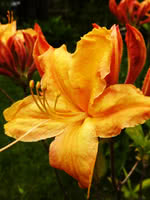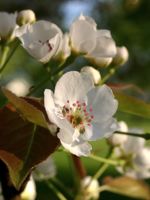Mon-Fri 9am - 5pm Mountain time
Ussurian Pear (Siberian) vs Golden Lights Rhododendron (Azalea)
Rhododendron x Golden Lights
Pyrus ussuriensis
NOT AVAILABLE THIS SEASON - MIGHT RETURN
(we don't know if or when this product will be restocked)
NOT AVAILABLE THIS SEASON - MIGHT RETURN
Golden Lights Rhododendron is an exceptionally cold hardy, deciduous azalea. Part of the Northern Lights Series, this shrub was cultivated specifically to withstand harsh winters, making it ideal for our prairie climate.
In late spring you'll be drawn to its beautiful, golden, sweetly fragrant flowers. Pruning is recommended after the flowers are spent to control the size and shape of this shrub.
Consider Golden Lights Rhododendron when planning your next hedge, or plant it on its own as a striking specimen plant.
Ussurian Pear is the most cold hardy of all pear species. It is frequently used as a rootstock or as a pollinizer for other pear varieties. The pinkish-white flowers that bloom in the spring and the striking fall colours make it well-suited as an ornamental addition to your landscape.
Ussurian Pear can also be used for forming hedges as it tends to branch quite low.
While the Ussurian Pear is considered self-pollinating, planting with another pear variety will increase yields. Can be paired with Krazulya Pear or Beedle Pear.
Golden Lights Rhododendron (Azalea) Quick Facts
Ussurian Pear (Siberian) Quick Facts
Toxicity: All parts of a rhododendron bush, including the leaves, stems and blooms, are toxic to cats, dogs, and horses.

